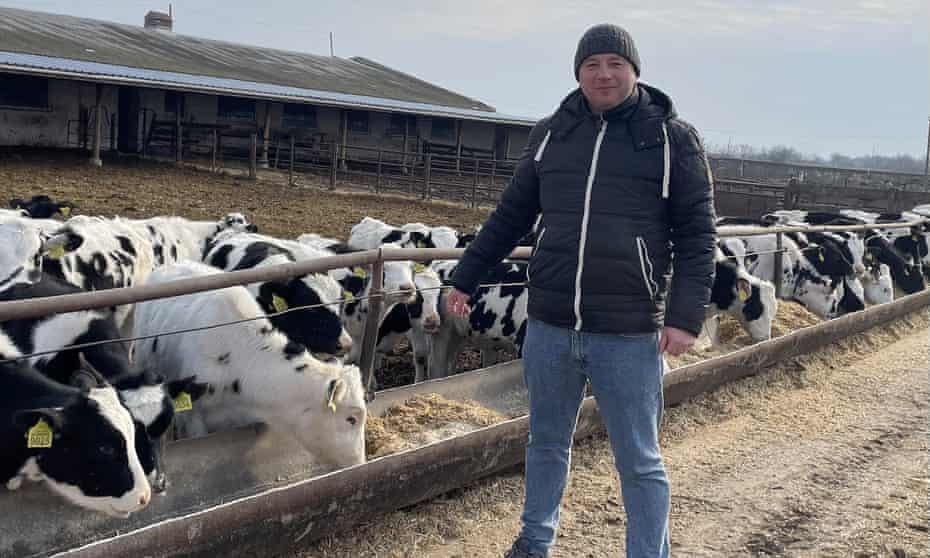
Farmers in Ukraine describe depleting potato stocks, slaughtering their own pigs, and Russian troops appearing at the gate.
The Russian invasion of Ukraine has upended the farming industry, raising fears of disruption to domestic and international food supplies. The Guardian has spoken to three farmers about what life is like on the ground, with the Russian army hiding tanks in barns and stocks of potatoes expected to deplete within weeks.
Andrii Pastushenko, 39, is a dairy farmer who lives 12 miles from Kherson in the south of Ukraine, a city that has been under control of the Russian military.
On Monday, 10 Russian soldiers came to set up a base on the farm, leaving their tanks in barns, and more soldiers arrived later. But after overnight shelling by Ukraine’s military at Kherson airport, the Russian troops left on Wednesday morning.
“They quickly packed up this morning, taking two cars and food from the farm and saying they were ‘nationalising’ them,” he said, adding that they did not pay for either but said: “See you soon.”
The 350-cow dairy farm had been selling milk to the French dairy processor Lactalis, which has a presence in Ukraine.
Since the war started, Pastushenko’s staff have been making butter, quark and cream, and distributing it to local villages and families. They have also been turning grain supplies into porridge and slaughtering cows to provide meat for the 70 farm workers on the site as well as local residents.
“Right now everyone stays on the farm and keeps working,” said Pastushenko, who remains there with his 15-year-old son. His wife has moved to the city of Zhytomyr, 90 miles west of Kyiv, with their younger son.
“In the first five days of the war, a milk truck came from Kherson and picked up milk and delivered it to all the city’s hospitals before distributing the leftovers to the local people. Now we have someone in every village who comes to the farm and picks up milk and food then distributes it, with the help of the churches,” he said.
Pastushenko says they are running out of feed for the cows and, with Russian soldiers in the area, he does not know if they will be able to plant crops or harvest silage for the cows to eat.
“I can’t leave. I can’t take my son away. We are trapped here. If I leave, the hungry people will steal and slaughter the cows and other animals. We do that already, but only one cow every two days because we need meat for my employees and the rest of us,” he said.
Other livestock farmers in the country have also spoken of their inability to get meat or animals off their farms and on to processors to distribute to the wider population.
Kees Huizinga has a 2,000-cow dairy herd and a 450-sow pig farm near Cherkasy, 120 miles south of Kyiv. Although there are no Russian soldiers in his area at present, he said he had lost a number of staff to military service.
Milk from the farm is still being collected by a milk processor, who sells it in western Ukraine where there is high demand from refugees who have moved there from other parts of the country. But Huizinga’s pigs are mostly being slaughtered on the farm now and used by the army and locals. “It’s pretty primitive, but we have no choice,” he said.
Another farmer who co-manages a 2,000-hectare (4,940-acre) arable farm near the city of Lviv in western Ukraine, grows potatoes and protein crops including soya beans. The farm is a major supplier of potatoes to domestic markets, with a new crop due to be planted within the next few weeks.
His farm supplies potatoes from storage to the Ukrainian military and refugees, but he said he only had about four to five weeks of supply left. He said growers in the country had critical decisions to make in the next fortnight about what spring crops to grow this year, with shortages of fuel, fertiliser and pesticides.
“There is a desire from the Ukrainian government that the crop is planted. We will scale back slightly here, but do plan to plant. However, we need help particularly in terms of crop-protection supplies to protect our potatoes from diseases such as late blight that can devastate crops,” he said.
The farmer, who has been based outside Ukraine for the past few years but communicates daily with staff on site, said the farm was currently free from Russian military interference but he was worried about the safety of his staff. “Things have escalated here this week,” he said.
Saturday, 19 March 2022